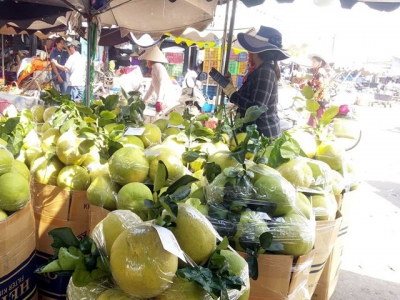Doors wide open for local farm produce to enter US market

Pomelos are projected to become Vietnam’s seventh fruit to successfully make inroads into the United States’ market, following on from dragon fruit, rambutans, longans, lychees, star apples, and mangoes, according to the Vietnam Plant Protection Department.
Vietnam is expected to get a US export license for pomelos by the end of this year.
Hoang Trung, director of the Plant Protection Department, gave the prediction upon the arrival of officials from the Animal and Plant Health Inspection Service US (APHIS) in the country. The group have arrived in order to resume their inspection with regard to the quality of fruit to be exported to the US following the completion of the mandatory novel coronavirus (COVID-19) isolation period.
Despite the COVID-19 impact, fruit exports to this market since the beginning of the year have reached approximately 6,000 tonnes, a slight decline in comparison to the same period last year, according to Trung.
Fruit exports to US ahead in the remaining months of the year are anticipated to increase both in terms of volume and price, said Trung adding the country is expected to receive a US export license for pomelos later this year.
To facilitate the export of fruit products to this market, there will be an additional irradiation centre to be set up in Hanoi, in addition to the existing one in Ho Chi Minh City, therefore saving on transportation costs when exporting to the US market, Trung noted.
Moreover, Timothy Westbrook, a representative of the APHIS, emphasised that US consumers remain very keen to purchase Vietnamese fruit that go on sale at supermarkets in the North American country.
At present, the US is one of Vietnam’s key agricultural trading partners, with six types of local fruits permitted to enter the US market, grossing roughly US$20 million per year.
Nguyen Dinh Tung, chairman of Vina T&T Group, stressed that farm produce exports to this market must be strictly inspected in terms of residues of pesticides, pathogens, and diseases.
Trung also pointed out that fruit exporters must meet three major standards in relation to growing areas, packaging plants, and irradiation facilities in line with US requirements before entering the demanding market. Most notably, apart from being granted with codes, cultivation areas must also be located on Google Maps.
Since the beginning of the year, there have been no export shipments that have violated US standards, Trung noted.
Related news
 Asia rice-Vietnam rates drop as harvest begins, Philippines halts buying
Asia rice-Vietnam rates drop as harvest begins, Philippines halts buying Rice export prices fell in top hubs this week, with rates in Vietnam extending a slide as the Philippines halted purchases and the onset of a new harvest
 Bến Tre households store rainwater during dry season
Bến Tre households store rainwater during dry season Farmers and households affected by saline intrusion and drought are storing fresh water and rainwater for use in the dry season in Bến Tre Province.
 Localities loosen management and businesses cheat, Vietnamese agricultural products
Localities loosen management and businesses cheat, Vietnamese agricultural products If planting areas and packing houses are not checked and supervised well, they will often violate the regulations of the importing country